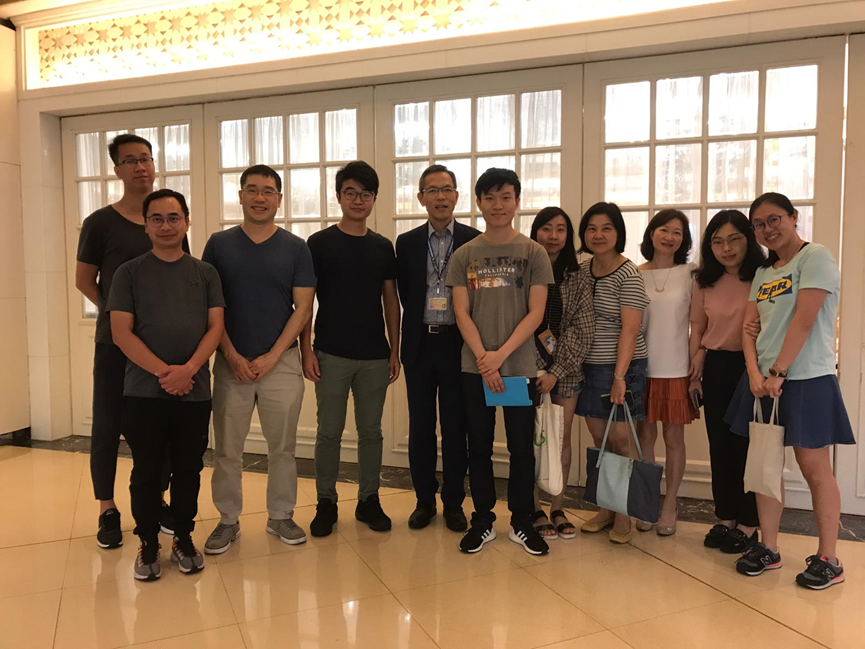RESEARCH
The Rheumatology & Clinical Immunology Laboratory Research Team
Principal Investigators:
Prof. Chak Sing Lau
Dr. Vera Sau Fong Chan
Dr. Philip H Li
Current research staff and students:
Dr. Frankie Chi Fat Ko
Mr. Albert Wai Kin Chan
Miss Ivy Lo
Mr. Guanghua Chen
Mr. Hiu Chung Law
Mr. Ken Kong
Mr. Stephen Au
Mr. Jimmy Li
Ms. Dorothy Lam
Ms. Christine Kwan
Miss Kylie Yuen
Miss Ling Ling Ng
Current research postgraduates:
Miss Jia Xin Chow (PhD candidate)
Miss Jie Ma (PhD candidate)
Mr. Gavin Shun Yin Sze (MRes candidate)
Mr. Walter Siqi Wang (MRes candidate)
Graduated research postgraduates since 2013:
Dr. Selena Sheng Yan (PhD)
Dr. Rachel Chung Yee Tam (PhD)
Dr, Haijin Wu (PhD)
Dr. Ian Kar Yin Lam (PhD)
Dr. Gloria Guo (PhD)
Dr. Ada Lok Yan Yim (PhD)
Mr. Daniel Luk (MPhil)
Mr. Christopher Chak Pui Lee (MPhil)
Mr. Alfred Lee (MRes)
Research Interests
1. Systemic Lupus Erythematosus (PIs: Prof CS Lau & Dr. Vera SF Chan)Our main research area is to study the immunobiology of systemic lupus erythematosus (SLE), a prototypic autoimmune disorder that predominantly affect young females. Immunologically, SLE is characterized by a loss of tolerance to self-antigens, T and B cell activation, and increased autoantibody production. Immune complex mediated vasculitis and specific antibody directed organ damage account for many of the clinical manifestations, however, the etiology of SLE remains unclear. Our team has previously identified phenotypic, functional abnormalities as well as the underlying mechanisms various immune cellular compartments in SLE patients. Through understanding the underlying causes of cellular and molecular immunodysregulation in SLE we aim to identify potential therapeutic targets for exploitation in clinical settings. Our current research projects focus on the following areas:
- Inflammasome dysregulation in SLE (GRF-funded): a mechanistic study to dissect the role of a core immune component in SLE patients
- Elucidation of the roles of regulatory non-coding RNAs in SLE: to explore the unidentified roles and mechanisms of regulatory RNAs in autoimmunity
- Dissecting SLE disease heterogeneity by Omics technologies: a large scale research program to study lupus immunopathogenesis, teasing out pathogenic factors at the genetics, expression and cellular functional levels in correlation with patient stratification by clinical manifestations.It is a multidisciplinary research program, collaborating with geneticists, bioinformaticians and rheumatologists.

As the first and only adult centre for Immunology & Allergy research in Hong Kong, we have led many “first” research initiatives in the region. Our primarily research interests are on drug allergy, anaphylaxis, immunotherapy and adult immunodeficiencies.
We previously published the first epidemiological study of beta-lactam allergy in our region and identified the high false rate of penicillin “allergies” among Chinese. Since then, we continue to research into the unique characteristics and epidemiology of various drug allergies in our population. With the growing problem of antibiotic allergy, our team pioneered the region’s first dedicated drug allergy clinics to identify unique ways in streamlining and improving drug allergy diagnostics.
Since reporting the rapid growth of anaphylaxis in Hong Kong over the past decade, we have focused more into dissecting the causes of anaphylaxis in our locality. We currently run the only territory-wide anaphylaxis pathway for early assessment and investigation undiagnosed anaphylaxis. Our team lead the publication of the local guidelines regarding the prescription of adrenaline autoinjectors and continue to investigate on new ways to further improve anaphylaxis outcomes. We are also interested in the cost-effectiveness of immunotherapy in Hong Kong and started with our first house dust mite desensitization project in collaboration with otorhinolaryngology.
In addition to allergy, our team also has interest in identifying adult immunodeficiencies. We are interested in identifying new or previously undiagnosed






